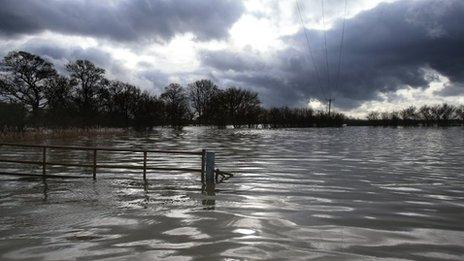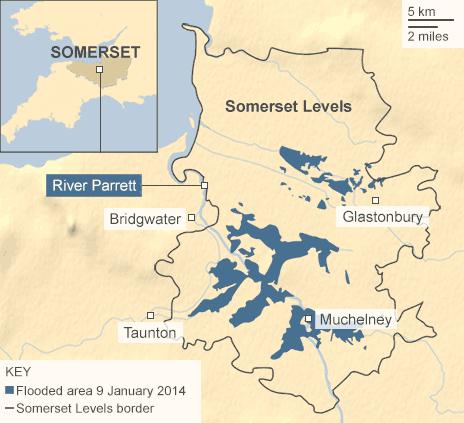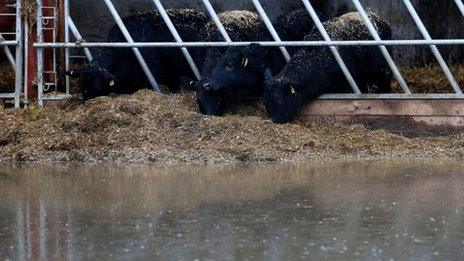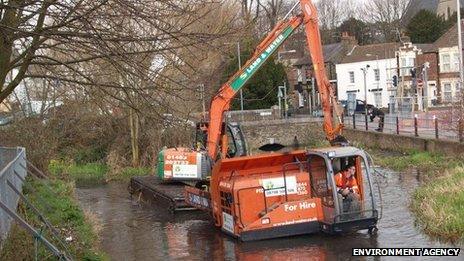Would river dredging solve floods?
- Published

Farmers in Somerset held a demonstration against the Environment Agency on Sunday
Farmers in Somerset claim a lack of river dredging has worsened the impact of the flooding in the area. But what is dredging and what are the arguments around its use?
James Winslade, who runs Yeo Farm near Taunton - which is mainly under water - is just one of the famers urging the Environment Agency to dredge rivers to help alleviate flooding.
"This is the second year in a row now and we've been banging on to the agency cleaning the rivers out. They're 42% silted up," he said.
He is backed by National Farmers' Union, which has written to the floods minister calling for the re-introduction of "significant and consistent" river maintenance work.
"We must see urgent action by the Environment Agency, backed by Defra ministers, to allocate sufficient resources - or the situation, not simply in terms of the damage done to land and property, but also to trust in central government and its agencies, will be irreversible," regional director Melanie Squires said.
About 1,000 farmers manage the Somerset Levels - 170,000 acres of land. There is currently a "major emergency" in the county as large areas remain under water following heavy rain over the past month.

Long-term solution
Dredging normally refers to increasing the depth of the river channel by removing silt that builds up over years.
It would usually take place using either a barge with a vacuum or a digger removing material while stationed on the bank. How it is disposed of would depend on the area or the state of the material.

The Environment Agency says it spent £45m in the last financial year on improving river flow
BBC environment correspondent Roger Harrabin says it is a complex and controversial issue - and critics say it cannot be the total answer when more intense rainfall is anticipated if the climate changes as predicted.
He adds that it is a particularly thorny problem because the Environment Agency is facing big cuts in the staff that might deal with flood policy - there are difficult decisions to be made over how much is spent and how much priority should be given to farmland compared with homes.
The Environment Agency says it spent £45m in the last financial year on improving river flow, including dredging and weed clearance.
It says increased dredging would not have prevented the current flooding in the Somerset Levels - due to the sheer amount of water.
"Dredging is often not the best long term or economic solution compared with other flood risk measures such as building walls or providing storage upstream - and would not reduce flood risk on all the rivers on the Somerset Levels because of their tidal nature," a spokeswoman said.
'Allow floods'
Alastair Chisholm, policy manager at the Chartered Institution of Water and Environmental Management, explained that those in favour of dredging think that a bigger river will allow water to flow faster and more efficiently.
But he said it would not carry enough water when compared to the size of the flood plain - even if the capacity of the river were increased by 50%, it is a relatively small amount when compared to the amount of flooding in the area.

Dredging - shown here in Kent - would not stop floods in Somerset, says the Environment Agency
"Part of the solution, bearing in mind this is going to happen again and again, is to allow part of the flood plain to flood," he said.
"Building up huge river banks and dredging is a very old-fashioned approach which experience shows work to a point, but when we get these extreme weather events it's not enough."
He said the authorities should give farmers incentives to help the wider area by keeping a portion of their land as a flood plain.
But Bridgwater and West Somerset MP Ian Liddell-Grainger dismissed the claims that the rain would have overwhelmed the river system even if it had been dredged as "pathetic".
"It is an absolutely ridiculous excuse," he said. "This never flooded to this level ever in living memory, and we've got people who have been here for a long time. If you look back into the mists of time you don't have this."
Environmentalists have also expressed concerns about dredging being seen as a simple solution.
The RSPB says a range of measures is needed to develop a strategy for a flood-resilient future which should encompass five key principles which benefit both people and wildlife.
This includes ensuring rivers are working, providing for farmland upstream of the Levels to hold on to water for longer, and designing towns so drainage systems delay water on its way to rivers.
- Published27 January 2014
- Published27 January 2014
- Published27 January 2014
- Published26 January 2014